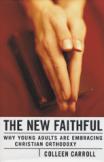In Need of Absolutes
In The New Faithful, Colleen Carroll, a young journalist from St. Louis, offers a breezy tour through the lives of today’s Protestant and Catholic young adults who practice a traditionalist form of faith. They clamor for pre-Vatican II pieties, embrace condemnations of abortion, homosexuality and premarital sex and see themselves as bearers of authentic Christianity in a worldand often a churchthat wants to sell the Gospel out to the latest social fads. They are the new counterculturalists who embrace Christian orthodoxy.
Zeal for Christianity consumes them. This book is full of eucharistic piety, rosaries, confession, incense-filled liturgies, dramatic conversions, devotion to the Bishop of Rome, natural family planning, Bible and catechism study, kneeling and fasting and costly grace of all sorts.
But today’s young traditionalists are not merely recreating 1950’s middle-class Christianity. They are often passionately service-oriented and open to expanded roles for women, concerned for racial and economic justice and debate among themselves about how tolerant they must be of the values of non-Christians (or progressive Christians). They want to be in the world, changing it for Christ, not holed up in circled wagons of homogeneity.
These new faithful want firm and even rigid guidance, unquestionable absolutes. They represent a compelling response to postmodern culture’s plurality, diversity and ambiguity. Indeed, Carroll’s most persuasive argument is that because of the implosion of an insular Catholic culture and the emergence of Catholics into postmodernity, orthodoxy is a more costly choice than ever before, and inherently important and interesting for that reason alone. Yet Carroll’s emphasis on the decisional dimension of traditionalist faith underplays the psychological background that informs the crafting of all religious identity. Are there prevalent psychological patterns in young adults who choose a more progressive or more traditionalist Catholic identity? Carroll does not raise the question, seeing it only as a matter of theologically choosing the truth of Christian orthodoxy.
But which Christianity consumes these new faithful? Despite avowals of fidelity to historic Christianity, the faith of these young adults is ahistorical. They cannot admit that faithful Christians have disagreed on important doctrinal and moral issues throughout Christian history, or that official Catholic teaching has changed or developed on specific issues. They want Christian history and Catholic identity to be much less ambiguous, historical and contested than has actually been the case.
The problem of ahistoricity goes right to the heart of the use of the word orthodox to describe these young adults. What does orthodox mean? Carroll suggests, with Chesterton, that it means adherence to the Apostles’ Creed and the general historic conduct of those who heed such a creed. Carroll seems oblivious to the fact that this definition raises 10 times more questions than it answers. The Creed, of course, leaves out the concrete life of Jesus; and what general historic conduct means is a tremendously delicate issue. The treatment of women as inherently inferior, as well as violent Christian triumphalism, are both part of the general historic conduct of Christians who professed the Creed; but in Carroll’s book you find no young adults who are thinking about why such historic conduct is inappropriate today.
Carroll also describes orthodoxy as including acceptance of a transcendent moral authority as revealed in the Scriptures...regular worship and prayer...belief in absolute truth, and a recognition of objective standards of personal and public morality. No thoughtful progressive Christian would disagree with any of this. Thus, her use of orthodoxy to describe these new faithful is condescending and confused. It trades on a false dichotomy that animates the bookthat of upholding tradition versus reshap[ing] doctrine or moral teachings to fit contemporary life. She and other young traditionalists seem to think romantically that Christian tradition dropped pristinely from the heavens and therefore must be protected in its fragile innocence.
Moreover, Carroll joins these young adults in lobbing potshots at such groups as one Benedictine orderin which middle-aged nuns wear sport coats instead of religious robes and describe their spirituality in such vague terms as creation centered’ and open to the Spirit’. I imagine that if some of these young orthodox Christians were in the evangelist Mark’s community, they would be constantly criticizing Luke or John as accommodationist.
In addition, these young adults seem to have a largely uncritical acceptance of intense emotionalitydreams, feelings, ecstasiesas irrefutable evidence of the presence of the Spirit. Carroll herself concludes story after story with the precious gift of tears, meant to validate the authenticity of these young adults’ convictions.
Now let us frankly admit that every excess of these new traditionalists is also found among young progressive Catholics, among whom I count myself a member. But there’s an even stronger challenge here than a warning about religious chauvinism. The New Faithful is a damning critique of Catholic catechesis. Carroll inadvertently implies that lack of strong religious education in childhood may encourage a move to traditionalism in young adulthood.
Where does Catholic religious education go from here? Pedagogically, progressive Catholics cannot compete with these new faithful. There is no progressive alternative or equivalent to the Franciscan University of Steubenville or to Opus Dei. As long as progressive Catholics remain fractured and do not effectively steward their vision to a new generation, these new traditionalists willas Carroll rightly arguesincrease their influence well beyond their actual numbers. Those who have a more progressive interpretation of Catholic identity have to realize that an overconfidence in being right is neither appropriate nor strategic enough for the generativity of a progressive interpretation of Vatican II.
This article also appeared in print, under the headline “In Need of Absolutes,” in the November 11, 2002, issue.








